A reservation system manages the back-end processes of securing accommodations, flights, and services, ensuring availability and confirming transactions for travel agencies. In contrast, a booking engine offers a user-friendly online platform enabling customers to search, select, and purchase travel options directly on the agency's website. Integrating both tools optimizes operational efficiency while providing a seamless and convenient booking experience for travelers.
Table of Comparison
| Feature | Reservation System | Booking Engine |
|---|---|---|
| Purpose | Manages internal bookings, availability, and client reservations | Enables customers to book directly online in real-time |
| User Access | Used mainly by agency staff | Accessible to end-users and customers |
| Integration | Integrates with CRM and inventory management | Integrates with payment gateways and website |
| Automation | Partial automation for reservation handling | Fully automated booking, confirmation, and payment processing |
| Real-Time Updates | May have delayed inventory updates | Provides instant availability and pricing updates |
| Customer Experience | Indirect, handled by agency staff | Direct booking interface improving user convenience |
| Cost | Often subscription-based with setup fees | Variable pricing, often commission or transaction-based |
Understanding Reservation Systems and Booking Engines
Reservation systems enable travel agencies to manage and track customer bookings, inventory availability, and schedules efficiently, ensuring seamless coordination across services like flights, hotels, and tours. Booking engines serve as customer-facing platforms that facilitate direct online reservations by integrating with reservation systems for real-time data on availability, pricing, and confirmation. Understanding the distinction between reservation systems and booking engines is crucial for travel agencies to optimize operations, enhance user experience, and increase sales conversions.
Key Features of Reservation Systems
Reservation systems provide comprehensive management features including inventory control, customer data storage, and payment processing, enabling travel agencies to efficiently organize bookings and track availability. These systems integrate with multiple sales channels and offer real-time updates to prevent overbooking and streamline operations. Advanced reporting tools and customizable workflows enhance customer service and optimize resource allocation for travel agencies.
Essential Functions of Booking Engines
Booking engines enable travelers to search, compare, and purchase travel services directly online, streamlining the transaction process with real-time availability and instant confirmation. Essential functions include secure payment processing, multi-channel integration, and customizable fare rules that enhance user experience and operational efficiency. Unlike reservation systems that primarily manage backend bookings, booking engines interface with customers to provide interactive, seamless booking journeys.
Differences Between Reservation Systems and Booking Engines
Reservation systems primarily manage availability and handle customer data within a travel agency, facilitating internal coordination and service allocation. Booking engines enable direct, real-time online transactions by customers, integrating payment processing and instant confirmation features. The key difference lies in reservation systems being backend tools for management, while booking engines serve as customer-facing platforms for seamless online bookings.
Integration Capabilities in Modern Travel Solutions
Reservation systems offer robust integration capabilities with global distribution systems (GDS), property management systems (PMS), and customer relationship management (CRM) software, enabling seamless management of inventory and client data. Booking engines focus on direct integration with payment gateways, marketing tools, and website platforms to facilitate real-time bookings and personalized user experiences. Modern travel solutions require a hybrid approach, combining the comprehensive backend connectivity of reservation systems with the agile, front-end capabilities of booking engines to optimize operational efficiency and customer satisfaction.
User Experience: Reservation System vs Booking Engine
A reservation system streamlines the backend management of travel inventory, improving operational efficiency but often lacking a user-friendly interface. A booking engine prioritizes user experience by offering an intuitive, real-time platform that allows travelers to search, select, and confirm reservations instantly. Enhanced features like personalized recommendations and seamless payment integration in booking engines significantly increase customer satisfaction and conversion rates compared to traditional reservation systems.
Impact on Revenue Management and Upselling
A reservation system centralizes inventory and customer data, enabling dynamic pricing and real-time availability updates that enhance revenue management through accurate demand forecasting. Booking engines offer seamless, direct consumer interaction with personalized upselling opportunities like upgrades and add-ons, increasing average transaction value and profit margins. Integrating both systems optimizes operational efficiency and maximizes incremental revenue by aligning distribution strategies with targeted customer experiences.
Choosing the Right Solution for Your Travel Agency
A reservation system centralizes all travel bookings and inventory management, offering comprehensive control over availability and customer data, while a booking engine serves as a direct interface for customers to make reservations online. Travel agencies must evaluate factors such as scalability, integration with existing software, user experience, and cost-effectiveness when selecting between the two. Choosing the right solution enhances operational efficiency, increases booking rates, and improves overall customer satisfaction.
Security and Compliance Considerations
A reservation system integrates with multiple suppliers to manage availability and confirm bookings, requiring robust data encryption and compliance with PCI DSS standards to protect customer payment information. Booking engines, often embedded on agency websites, must implement secure SSL protocols and GDPR compliance to safeguard personal data during the online booking process. Both systems demand regular security audits and adherence to industry regulations to prevent data breaches and maintain traveler trust.
Future Trends in Travel Reservation Technology
The future of travel reservation technology emphasizes seamless integration between reservation systems and booking engines, leveraging AI-powered personalization and real-time data analytics to enhance user experience. Cloud-based platforms and API interoperability enable travel agencies to offer dynamic pricing, instant confirmations, and multi-channel accessibility across devices. Emerging trends also include blockchain for secure transactions and voice-activated bookings, reshaping how customers plan and finalize their travel arrangements.
Reservation system vs Booking engine Infographic

 bizdif.com
bizdif.com